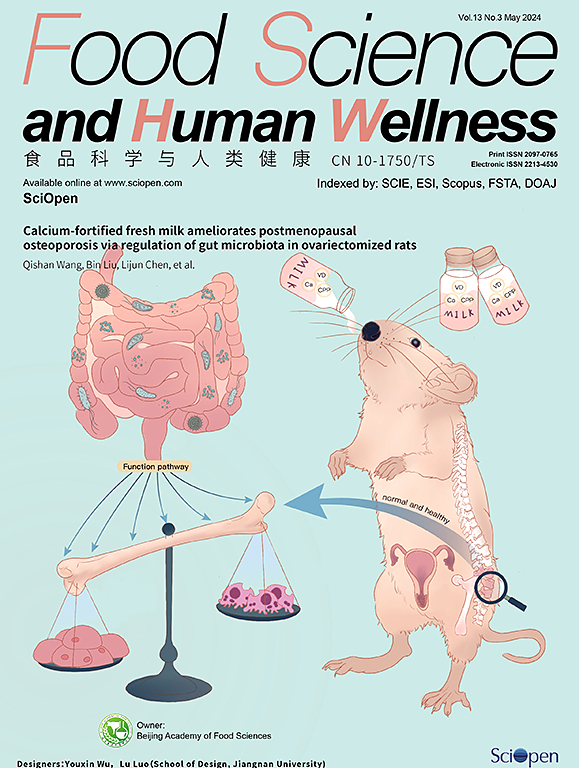Ganoboninketal C from Ganoderma boninense improves the efficacy of CDDP-based chemotherapy through inhibiting translesion DNA synthesis
IF 7.4
1区 农林科学
Q1 FOOD SCIENCE & TECHNOLOGY
引用次数: 0
Abstract
Translesion DNA synthesis (TLS) can bypass DNA lesions caused by chemotherapeutic drugs, which usually result in drug resistance. Given its key role in mutagenesis and cell survival after DNA damage, inhibition of the TLS pathway has emerged as a potential target for improving the efficacy of DNA-damaging agents such as cisplatin (CDDP), a widely used anticancer agent. Unfortunately, few suitable natural TLS inhibitors have been reported. Here, we found that a triterpenoid compound Ganoboninketal C (26-3) from Ganoderma boninense, a traditional Chinese medicine, can impair CDDP-induced TLS polymerase eta (Polη) focus formation, PCNA monoubiquitination as well as mutagenesis. Moreover, 26-3 can significantly sensitize tumor cells to CDDP killing and reduce the proportion of cancer stem cells in AGS and promote apoptosis after CDDP exposure. Interestingly, 26-3 can also sensitize tumor cells to Gefitinib therapy. Mechanistically, through RNA-seq analysis, we found that 26-3 could abrogate the CDDP-induced upregulation of Polη and PIDD (p53-induced protein with a death domain), 2 known factors promoting TLS pathway. Furthermore, we found that activating transcription factor 3 is a potential novel TLS modulator. Taken together, we have identified a natural TLS inhibitor 26-3, which can be potentially used as an adjuvant to improve clinical efficacy.
灵芝中的灵芝素 C 通过抑制转子 DNA 合成提高了 CDDP 化疗的疗效
转座子 DNA 合成(TLS)可以绕过化疗药物造成的 DNA 损伤,而这种损伤通常会导致耐药性。鉴于 TLS 在 DNA 损伤后的诱变和细胞存活中的关键作用,抑制 TLS 途径已成为提高 DNA 损伤药物(如广泛使用的抗癌药物顺铂(CDDP))疗效的潜在靶点。遗憾的是,目前鲜有合适的天然 TLS 抑制剂的报道。在这里,我们发现一种来自传统中药灵芝的三萜类化合物 Ganoboninketal C(26-3)可以损害 CDDP 诱导的 TLS 聚合酶 eta(Polη)病灶形成、PCNA 单泛素化以及诱变。此外,26-3 还能在 CDDP 暴露后使肿瘤细胞对 CDDP 杀灭显著敏感,并降低 AGS 中癌症干细胞的比例,促进细胞凋亡。有趣的是,26-3 还能使肿瘤细胞对吉非替尼治疗敏感。从机理上讲,通过RNA-seq分析,我们发现26-3可以抑制CDDP诱导的Polη和PIDD(具有死亡结构域的p53诱导蛋白)的上调,而Polη和PIDD是两种已知的促进TLS通路的因子。此外,我们还发现激活转录因子 3 是一种潜在的新型 TLS 调节因子。综上所述,我们发现了一种天然的 TLS 抑制剂 26-3,它有可能被用作提高临床疗效的辅助剂。
本文章由计算机程序翻译,如有差异,请以英文原文为准。
求助全文
约1分钟内获得全文
求助全文
来源期刊

Food Science and Human Wellness
Agricultural and Biological Sciences-Food Science
CiteScore
8.30
自引率
5.70%
发文量
80
审稿时长
28 days
期刊介绍:
Food Science and Human Wellness is an international peer-reviewed journal that provides a forum for the dissemination of the latest scientific results in food science, nutriology, immunology and cross-field research. Articles must present information that is novel, has high impact and interest, and is of high scientific quality. By their effort, it has been developed to promote the public awareness on diet, advocate healthy diet, reduce the harm caused by unreasonable dietary habit, and directs healthy food development for food industrial producers.
 求助内容:
求助内容: 应助结果提醒方式:
应助结果提醒方式:


